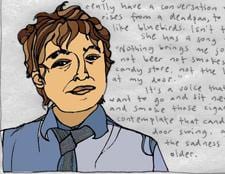Elisha Lim’s narrative comics are charming as hell — and I’m not just saying that because I love butch queers.
If you’re not familiar with her work, prepare yourself. Lim’s exhibit, 100 Butches — based on her soon-to-released book of the same name — is coming to Ottawa in July, so you’ll get a chance to take a peek.
100 Butches is an ode, a love letter of sorts to the many butches and rebellious queers that 30-year old Lim has loved or admired in her youth, her travels and her political work over the years. The butches are from around the world — from Berlin to Melbourne, from her Catholic school upbringing in Singapore to Toronto, where she now lives.
Lim started the project in 2007, while she was, as she puts it “broke and hopeless” in London, England. She had seen a call for comics artists for Diva magazine and was trying to think up a project that could help her pay the rent. She started drawing a sort of catalogue of butch images.
“My criteria was always, who turns me on? And who would turn on a reader?” says Lim. “I’ve been told sometimes that it’s weird for butches to like butches. But I want to look in the mirror and see what I think is hot. To me, it makes sense to both seek and emulate butch. When I was thinking of a series that I could really get into and get excited about, it was this — both my identity and my attraction. It’s fun and sexy, and everyone in the project really belongs under the banner of queer.”
The images are a mix of hot and sweet, and the accompanying text is poignant and thought-provoking, reflecting Lim’s anti-oppression politics.
“What’s important to me is using [this project] to capture different people’s experiences. When I started using the word butch, so many of the queers that I met were also involved in anti-occupation work in Israel-Palestine or helping refugees in Germany. That’s something that I’m really proud of about this community — that we tie together oppressions and see them all as connected and important.”
Through the project, Lim aims to both celebrate and critique butch identity and make room for people to talk about why they do or don’t identify that way.
“I almost wish I could change the title to “100 Butch Moments, If You’ve Had One of Those”. I do think [butch is] a limiting word, and I think it’s an outdated word. But people want to be in the book, and they help expand it. One of the comics is about [a dyke named] Cudbi, and she was saying that she doesn’t think that butch includes black dykes like herself and she would rather use stud or stemme. She said, ‘I’m going to be in this book and I’m going to say why I don’t use this word.'”
So how did Lim’s fascination with the more masculine side of dyke identity begin? She says that she’s been pretty lusty about butches ever since her first crush at the age of 13. Something about a close friend’s girl-toughness stupefied her, and she’s been passionate about exploring the complexities of this identity ever since.
The raw sex appeal that comes across in her images of butches is intentional, and even central to the meaning and motivation behind the project. But the political roots are also front-and-centre.
“Every ‘decade’ of butches is about a certain thing. The 10s are all about feminism. The 20s are all about anarchism, and the 30s are like forget anarchism, I want to talk about racism,” says Lim. “One thing that I’m really hoping that this project manages to do is to say things in the personal voices of the people in the community. I really hope that it reflects what’s going on around me.”
When you stop by the exhibit, be sure to check out Butch #38. The accompanying text is very personal, and one that Lim thinks people will relate to easily. That makes it her favourite of the images being featured in the Ottawa exhibit.

 Why you can trust Xtra
Why you can trust Xtra


